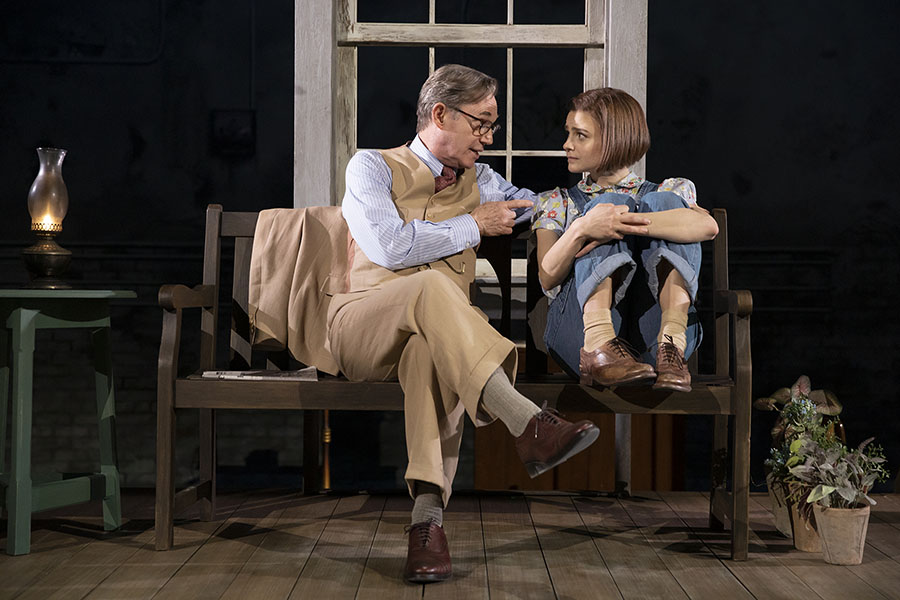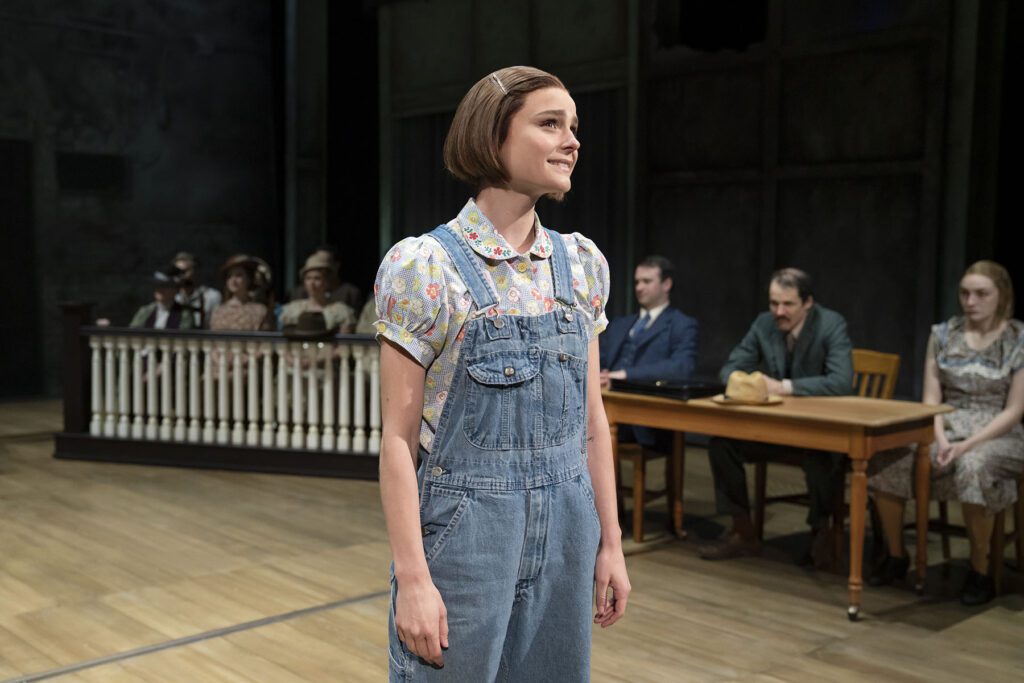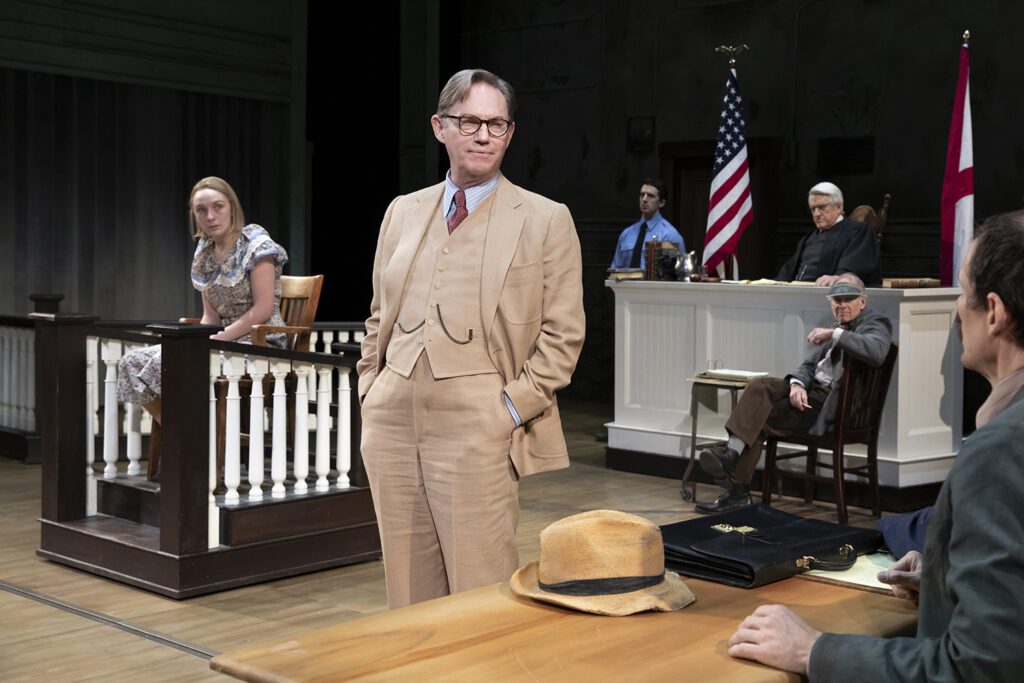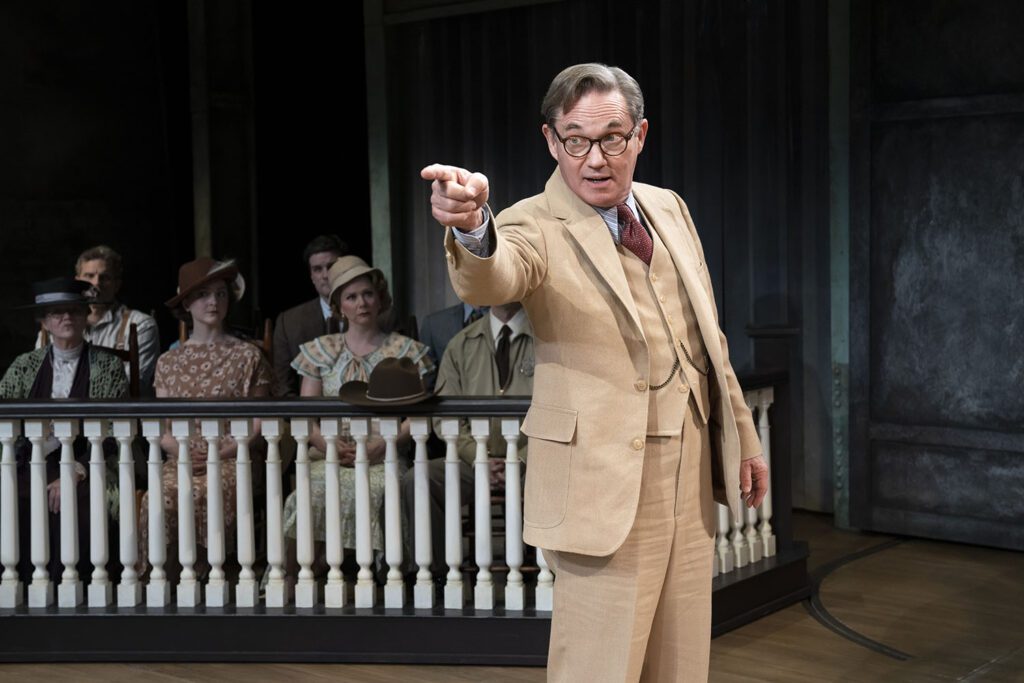The iconic character of Scout Finch from Harper Lee’s beloved masterpiece novel, To Kill A Mockingbird is stepping into the spotlight, brought to life by the dynamic talent of Melanie Moore in the acclaimed theatrical adaptation coming to Louisville June 20 to 25.
A Broadway veteran known for captivating performances in productions like Finding Neverland and Fiddler on the Roof, Melanie takes on the complex role of Scout with unwavering dedication and an innovative approach.
With a background that spans across acting and dancing, including a stint on the popular TV show “So You Think You Can Dance,” Moore’s trajectory is as rich and diverse as the characters she embodies.
“I was more of a trained dancer and sang some growing up — never did theater when I was younger,” she says. Her passion led her to New York City, where she branched out into acting and singing, eventually marking her Broadway debut.
In the Broadway rendition of Harper Lee’s To Kill A Mockingbird, Moore navigates the intricate narrative through the three ages of Scout, tackling the profound themes of racial disparity and societal awakening with authenticity.
Drawing upon the enduring resonance of Harper Lee’s novel and the classic film adaptation, this new theatrical experience offers a fresh perspective. Guided by Aaron Sorkin’s transformative script, and with Moore leading the cast, To Kill A Mockingbird is poised to be a compelling and evocative theatrical journey.
Unraveling the Layers
Scout Finch, the pivotal protagonist of Harper Lee’s seminal novel, has been enchanting readers for generations. She is a character who presents an intriguing amalgamation of childlike innocence, a keen sense of justice, and a refreshing, unvarnished outlook on life’s complexities.
In Sorkin’s riveting adaptation for the stage, Moore has undertaken the formidable task of bringing this beloved character to life with a unique flair and deep understanding of Scout’s essence.
“I do feel that there is an expectation and pressure to play this character in a certain way,” Moore admits, acknowledging the weight of such a revered role.
However, her innovative approach involves an interesting exploration of Scout’s different ages, a device used in the play to emphasize the character’s growth and introspection. This unique perspective allows her to explore Scout’s narrative journey in a way that’s rich, profound, and particularly engaging for audiences.
Moore’s approach involves tapping into her personal experience. “I grew up in the South and am from Georgia originally,” Moore says. “Most people would say they resonated with one of those three kids in the book, and I personally resonated with Scout.”
Moore has worked hard to meticulously refine her role, respecting Scout’s youthful innocence while capturing her progressive awareness of the world around her. “Scout, especially with the way the play is written, she can’t know what she doesn’t know until she knows it,” says Moore. “Connecting to my younger self is how I prepare for this role nightly.”
Though the play maintains the core elements that have made the character a literary icon, Moore’s Scout isn’t a mere facsimile of previous portrayals. Moore’s portrayal emerges as a three-dimensional figure, exuding palpable warmth, intelligence, and emotional depth. This is testament to Moore’s talent, the transformative power of Sorkin’s script, and the timelessness of Harper Lee’s character.
By breathing fresh life into Scout, Moore has succeeded in making the character her own, yet ever faithful to the spirit that Harper Lee originally crafted. In doing so, she reaffirms the perennial relevance of the classic story and the characters who dwell within its timeless narrative.
All in the Family
It’s a given that any production is a collective endeavor, but in the case of To Kill A Mockingbird, the chemistry among the cast is not just a necessity – it’s the heart of the show.
The dynamic synergy of the Finch family forms the core around which the narrative revolves, and Moore, along with her co-stars, brings this familial unit to life with astonishing realism.
“With my two co-stars playing Jem and Dill, it feels like a real family,” says Moore. These authentic bonds translate to their on-stage interactions, giving depth to the complex dynamics among the Finch children and their unique perspectives on the world. This rapport extends beyond the stage, with the actors often sharing a laugh during rehearsals and pushing each other to excel.
The bond among the characters is not limited to the children. The adult characters, including the enigmatic figure of Atticus Finch, Scout’s wise and compassionate father, are essential to this equation. Moore shares her experience of working with Richard Thomas, the actor playing Atticus: “He’s a dream to work with, and he’s taught me so much. He truly embodies the character.”
The portrayal of these complex relationships demands a certain finesse. However, the ensemble, under the guidance of their seasoned director, Bartlett Sher, navigates this intricate terrain skillfully. “Our director is brilliant at his craft, and he pushes us to delve deeper into our characters,” Moore says.
The power of To Kill A Mockingbird lies in its exploration of the human condition through the lens of a small Southern town. The characters, in their distinct roles, bring forth diverse perspectives, each contributing to the evolving narrative. The co-stars’ collaboration, fortified by mutual respect and shared commitment, is instrumental in portraying this depth and diversity.
This spirit of collaborative synergy brings a remarkable authenticity to the stage production. It resonates through the characters, the narrative, and ultimately, the audience’s experience.
Timeless Themes
Since its first publication in 1960, Harper Lee’s novel, To Kill A Mockingbird has stood as a beacon of literature, shedding light on the injustices and moral complexities that underpin society. Its contemporary relevance, however, is what makes this story a perennially compelling narrative, resonating through generations and across various adaptations — from its original novel form to the silver screen and now, onto the stage.
Moore echoes this sentiment. “The themes still resonate today. It’s a story about empathy, understanding, and the loss of innocence,” she says. “It’s an opportunity to remember how far we’ve come and yet how far we still have to go.”
Sorkin’s theatrical adaptation is mindful of this modern relevance. By weaving in contemporary dialogues and interpretations, it nudges the audience to view the classic narrative through a new lens. The play’s powerful depiction of racial prejudice, through the unjust trial of Tom Robinson, continues to serve as a poignant reminder of the persistent racial disparities in society.
“Being a part of this show is like holding up a mirror to society, showing not only the dark past but also encouraging the audience to reflect on the present,” says Moore.
Meanwhile, the compassionate wisdom of Atticus Finch, which continues to stir readers worldwide, finds new breath in the Broadway adaptation. His lessons to Scout and Jem about empathy and understanding are not just character dialogues – they’re universal truths resonating across the theater’s auditorium.
“Sorkin’s adaptation does more than retell a classic tale,” Moore says. “It prompts us to question, reflect, and empathize. It’s a call to be better.”
A New Lens on a Classic
The legacy of Harper Lee’s novel isn’t only carried by its profound themes, but also by its characters who have become synonymous with courage, empathy, and moral strength. It’s this legacy that the latest Broadway adaptation embraces while offering something unique to its audience.
For Moore, the production is about “presenting these well-known characters with an authenticity that respects the past but also acknowledges our present.” The reinterpretation of Scout through her three stages of life adds an additional layer of complexity and humanity to her character, making her evolution even more compelling to witness.
In addition to a refreshing narrative perspective, the production also features a more diverse cast, aligning with the shifting landscape of contemporary theater. “This version of To Kill A Mockingbird is a reflection of the world we live in. It’s diverse and inclusive, and that’s a powerful message in itself,” Moore says.
The magic of Sorkin’s script is brought to life with innovative staging, lighting, and sound design, immersing the audience into the world of Maycomb, Alabama, as never before.
“The production itself is a character in the story,” says Moore. “It elevates the experience, making it more immersive and intimate.”
A Show Not to Be Missed
As audiences sit in anticipation of the lights dimming and the curtain rising, they are not merely about to witness a stage adaptation of a beloved novel. They are about to embark on a journey through time, touching on themes as relevant today as they were over half a century ago.
Through the vibrant portrayal by Moore and the cast, To Kill A Mockingbird is more than a play – it’s an urgent, timeless conversation. One that compels you to listen, reflect, and act. This makes the show not just a desirable ticket but an essential experience.
“This play is for everyone,” says Moore. “It’s a reminder of our shared humanity, our shared struggles, and our shared hopes. It’s a story about love, understanding, and justice.”
Don’t miss this opportunity to see Moore and the exceptional cast in this powerful production of To Kill A Mockingbird. Come join the conversation, bear witness to a classic reimagined, and leave with a renewed understanding of this enduring masterpiece.
To Kill A Mockingbird runs from June 20 to 25 at The Kentucky Center. Tickets are on sale now and available at Louisville.Broadway.com or by calling (502) 584-7777 or visit Louisville.Broadway.com
Preview by Daniel Chioco
Photos by Julieta Cervantes









